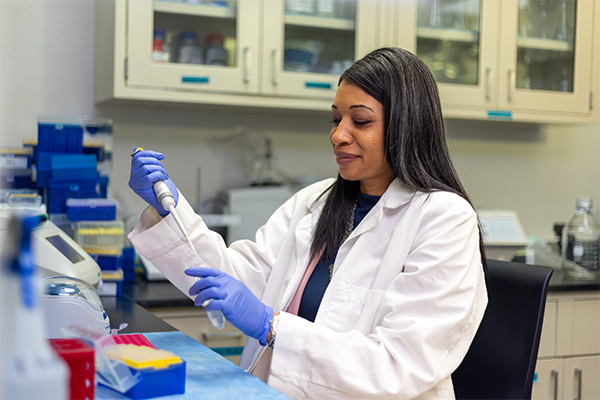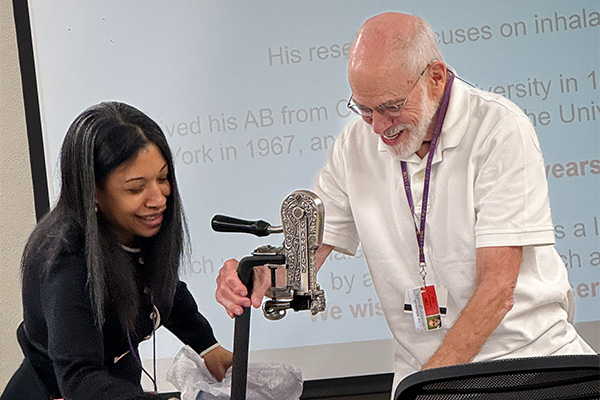Vaping, pregnancy, and lung disease risk: Dr. Noël leads NIH-funded research in a quest to improve public health
June 25, 2025

Dr. Alexandra Noël is on a mission to conduct fundamental research to help improve public health in Louisiana and beyond, uncovering how vaping during pregnancy affects the respiratory health of both mothers and their offspring. Her groundbreaking research is paving the way for better understanding, prevention and treatment of potential lung diseases following gestational exposures to vaping products.
In March 2025, she was awarded a grant from the National Institutes of Health (NIH) to study how prenatal exposures to electronic nicotine delivery system (ENDS) aerosols containing metals can impact the neonatal pulmonary immune system to make the lungs vulnerable to allergic asthma.
According to the National Institutes of Health, vaping involves a battery powered device called an e-cigarette that heats a liquid into a vapor that can be inhaled. The vapor may contain nicotine (the addictive drug in tobacco), flavoring, and other chemicals. E-cigarettes can also be used with marijuana, hash oil, or other substances. NIH warns that vaping may pose serious and avoidable health risks. Exposure to nicotine during youth can lead to addiction and cause long-term harm to brain development. The vapor can also contain toxins (including ones that cause cancer) and tiny particles that are harmful when breathed in.
“When people vape, they are inhaling an aerosol (vapor) containing nicotine, chemicals and metals, including copper. We think it plays a role in immune responses and the development of asthma and are looking at how vaping impacts the respiratory health of offspring when exposed during gestation,” said Dr. Noël, associate professor of comparative biomedical sciences at LSU School of Veterinary Medicine and director of its Inhalation Research Facility.
Milestone research
Dr. Noël’s research is a pivotal first step for early management of asthma development for prenatally ENDS-exposed infants. The renewable NIH grant provides $450,000 per year for five years. It is Dr. Noël’s first NIH RO1 grant, a major milestone for any biomedical researcher, especially a young or early-career investigator.
“This research project is a long time in the making. I’ve studied the effects of vaping for many years. Now, I am focusing on the mechanisms by which the damage occurs,” said Dr. Noël, who has chosen to conduct her work at LSU Vet Med, a research powerhouse ranked #6 in National Institutes of Health (NIH) research funding per faculty member and #9 in total NIH research funding overall among vet schools in the U.S. Dr. Noël’s lab has been continuously funded by the NIH since 2018. She has led several extramurally funded research projects totaling more than $4 million dollars.
The number of pregnant women using ENDS during pregnancy in the U.S. is on the rise, up to a half million annually, despite growing evidence of adverse effects in newborns. This research is a pivotal first step for early management of asthma development in infants prenatally exposed.
According to the Centers for Disease Control and Prevention’s Pregnancy Risk Assessment Monitoring System, approximately 7% of pregnant women in the United States use electronic-cigarette (e-cig) devices during pregnancy. There is, however, no scientific evidence to support e-cig use as being 'safe' during pregnancy. Little is known about the effects of fetal exposures to e-cig aerosols on lungs.
Health risks
Fetal development is a sensitive time, a window of vulnerability to toxic exposures, which can lead to lifelong respiratory health consequences. Epidemiological studies suggest that maternal vaping, estimated at 7% of pregnant women in the U.S., is associated with infants born small-for-gestational-age, a clinical indicator for increased risk of complications in lung diseases.
The long-term respiratory health effects in these offspring, however, are unclear. Dr. Noël’s research aims to change that by pinpointing the ways in which prenatal exposure to electronic nicotine delivery system (ENDS) aerosol modulates the neonatal pulmonary immune system to prime the lungs for allergic asthma. Although the metals used in ENDS coils and atomizers vary across types of devices, copper is in the top two most frequently detected metals in ENDS aerosols, and in a woman, transplacental transfer of copper from secondhand ENDS exposures was documented. Copper has allergic sensitizing properties and its accumulation in tissue decreases DNA methylation, which can affect how that molecule functions in the body, potentially turning genes on or off, influencing hormone production, or affecting cellular signaling.
Overall, this research will help determine blood-based biomarkers of prenatal ENDS exposures, a pivotal first step for early management of lung diseases for the half million prenatally ENDS-exposed infants born each year in the U.S.
Significance of fundamental research
NIH fundamental research has led to 153 Nobel Prizes and 198 Lasker Prizes (often dubbed “America's Nobel,” it honors groundbreaking contributions to our understanding of human disease).
“This work is based on the research I’ve conducted here since 2017. My published data reinforced my focus on Interleukin-10 (IL-10),” she said. IL-10 is a cytokine with a crucial role in regulating the immune system, particularly in modulating inflammation.
LSU-OLOL research
Dr. Noël also is part of a research program between LSU and Our Lady of the Lake Health on a related topic. The Collaboration in Action Program (CAP) awarded $1.2 million to five winning teams in an inaugural round of research funding, which includes Dr. Noël's respiratory health research. She leads an interdisciplinary team that uses experimental models to study the social and behavioral factors associated with maternal vaping, as well as vaping’s impacts on birth outcomes and the development of asthma in offspring.
“In Louisiana, the use of vaping products or electronic cigarettes has a high prevalence among women of reproductive age,” Noël said. “We already know maternal smoking negatively impacts neonatal respiratory health, but we don’t know if this also holds true for maternal vaping. I’m looking at the adverse effects of vaping during pregnancy.”
One of her team’s hypotheses is that intended pregnancies, women who plan to get pregnant, lead to a higher rate of vaping cessation and more favorable birth outcomes.
“Understanding the effects of maternal vaping is of critical relevance for the health of Louisiana citizens, as behaviors like vaping during pregnancy ultimately impact neonatal respiratory health, including chronic lung diseases like asthma,” Noël said.
Noël’s interdisciplinary team includes Dr. Heather Rackin, associate professor of sociology at LSU and social demographer whose research focuses on fertility intentions, socioeconomic inequality in family context, and population health and well-being. Their study is providing a framework to identify high-risk populations of pregnant women and their children in Louisiana and develop targeted preventive and interventional strategies.
Because e-cigarettes, or vaping, first appeared on the market in 2007, much remains unknown about its impact, including the chemicals that make up the vapor inhaled and how they affect respiratory health over the long term.
LSU and Our Lady of the Lake Health, LSU’s CAP, work together to fight heart disease, cancer, accidents and chronic respiratory diseases, all leading causes of death in Louisiana that impact its citizens disproportionately.
“This first investment demonstrates how top-notch university research combined with strong and strategic hospital partnerships bring better health to the people of Louisiana and beyond,” said Robert Twilley, vice president of research and economic development at LSU. “Our shared commitment to building and supporting winning research teams will translate to many new discoveries and solutions in years to come.”
Dr. Noël has been a member of the LSU Vet Med faculty since March 2017. She earned her Ph.D. from the Université de Montréal, Faculté de Médecine in 2013. Her research focuses on the production and characterization of aerosols, including e-cigarette aerosols, second-hand smoke, engineered nanoparticles, ultrafine or fine particles, as well as inhalation and developmental toxicology. She delves into the fundamental mechanisms at the epigenetic, molecular, and cellular levels that underlie the developmental origins of health and disease in relation to respiratory effects caused by distinct emerging inhaled environmental pollutants.
Life’s work
Dr. Noël remembers her parents asking, “Why study cigarette smoking? We know it’s bad for you.” She nevertheless pursued her interest in lung disease and came from Montreal to LSU Vet Med as a post-doctoral researcher studying nanotechnology and nanoparticles in pulmonary health more than a decade ago.
As Dr. Noël honed her expertise in cigarette tobacco exposure, vaping was gathering momentum. Suddenly, she was able to apply her scientific knowledge to addressing and treating a new and pressing problem.
“It’s timely work. I didn’t expect to contribute on this magnitude. It’s a case of being at the right place at the right time,” she said.

Dr. Noël presents her mentor, Dr. Arthur Penn, with a retirement gift. She succeeds him as director of the LSU Inhalation Research Facility.
She credits working with mentor Arthur Penn, Ph.D., retired professor of toxicology in the Department of Comparative Biomedical Sciences and former director of the Inhalation Research Facility at LSU Vet Med, and the school’s facilities as positive factors supporting her research efforts. Dr. Noël succeeded Dr. Penn as director of the Inhalation Research Facility.
“People initially thought vaping was safer than cigarette smoking. I decided to test it. Claims are made that vaping is a reduced risk compared to cigarettes, but when compared with breathing air—no, it’s not safe. We could see in the lab that it wasn’t. Inhaling vapor is harmful,” she said.
“You can’t really predict the subject of a lifelong work. There are always emerging areas,” said Dr. Noël.
As for vaping, she said the general public believes it isn’t as bad as it is.
“A claim cannot be made that it’s harmless. Research will provide the proof,” said Noël, whose continued research uncovers answers for the betterment of public health.